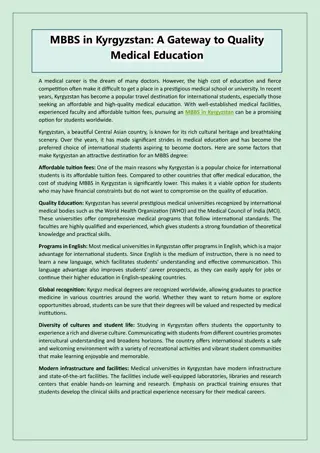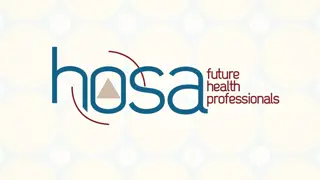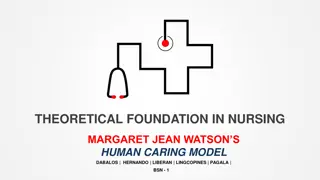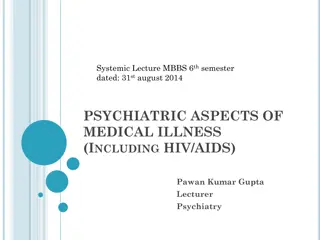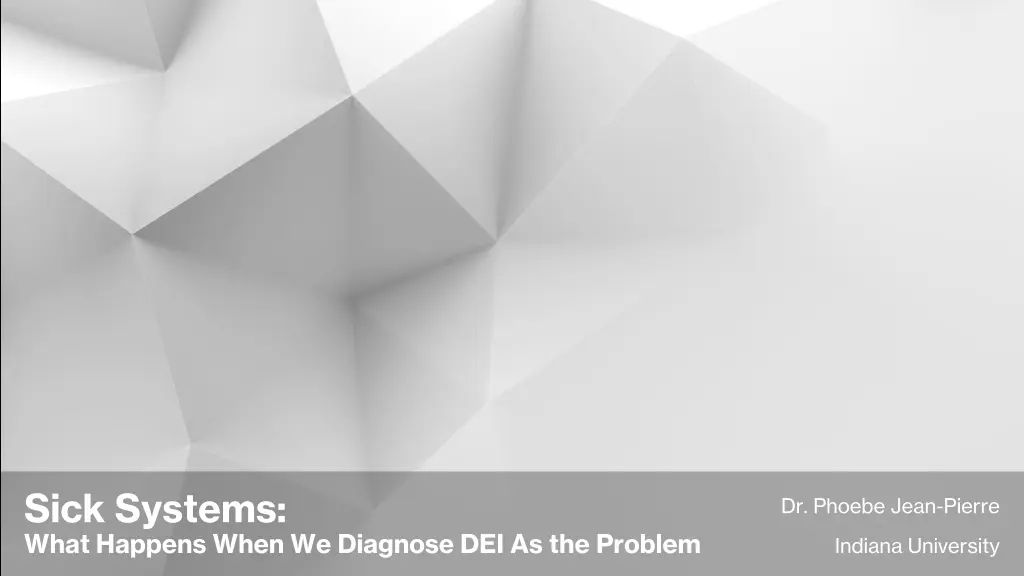
Understanding the Impact of DEI Rollbacks
Explore the implications of recent DEI rollbacks on various sectors, including education and employment, as initiatives are dismantled, leading to significant shifts in policies and practices. Witness how institutions like MIT and the U.S. Department of Education respond to these changes.
Uploaded on | 0 Views
Download Presentation

Please find below an Image/Link to download the presentation.
The content on the website is provided AS IS for your information and personal use only. It may not be sold, licensed, or shared on other websites without obtaining consent from the author. If you encounter any issues during the download, it is possible that the publisher has removed the file from their server.
You are allowed to download the files provided on this website for personal or commercial use, subject to the condition that they are used lawfully. All files are the property of their respective owners.
The content on the website is provided AS IS for your information and personal use only. It may not be sold, licensed, or shared on other websites without obtaining consent from the author.
E N D
Presentation Transcript
Sick Systems: What Happens When We Diagnose DEI As the Problem Dr. Phoebe Jean-Pierre Indiana University
Diversity Equity Inclusion
DEI Rollbacks (2025) EO 14151 (January 2025) Ending Radical and Wasteful Government DEI Programs And Preferencing Eliminated: federal DEI programs and initiatives labeled them as wasteful
DEI Rollbacks (2025) EO 14173 (January 2025) Ending Illegal Discrimination and Restoring Merit-Based Opportunity This order revoked several previous executive orders that mandated non- discrimination and affirmative action by federal contractors Effectively dismantled DEI efforts within federally funded programs
DEI Rollbacks (2025) U.S. Department of Education has taken action to eliminate DEI initiatives These steps include removing references to them in public facing communications and associated workforce programs Schools are also feeling pressure from the U.S. Department of Education, which has advised cutting DEI programming, scholarships, and more.
DEI Rollbacks (2025) The Equal Employment Opportunity Commission (EEOC) began scrutinizing DEI programs EEOC asserted that certain practices may violate Title VII of the Civil Rights Act Title VII of the Civil Rights Act of 1964 is a federal law that prohibits employment discrimination based on race, color, religion, sex, or national origin. Goal: to ensure equal opportunities in hiring, compensation, and other aspects of employment for individuals.
Higher Education Response to Rollbacks Massachusetts Institute of Technology (MIT) Closed the Institute Community and Equity Office Marked an official end to DEI programs MIT is shifting towards a merit-based admissions and hiring process. University of Michigan Shut down DEI programs and offices (Office of Diversity, Equity and Inclusion and Office for Health Equity and Inclusion) The university cites pressure from the Trump administration and wanting to comply with federal directives
The Effects of DEI Rollbacks cannot be Contained.
DEI Rollbacks & Health DEI rollbacks will also affect Medical schools Medical education Medical Students Patients
EDUCATE Act Embracing Anti-Discrimination, Unbiased Curriculum, and Advancing Truth in Education Introduced in Congress by Rep. Greg Murphy, MD (March 2024) The EDUCATE ACT and related policies target DEI in medical schools in education, programming, and activities
EDUCATE Act What s at stake? Patient safety, legal accountability, and healthcare equity Rather than Embracing Anti-Discrimination, Unbiased Curriculum, and Advancing Truth in Education The EDUCATE Act undermines the legal and ethical obligations of medical institutions to provide equitable care. Long term it could lead to increased liability and regulatory challenges
The EDUCATE Act is not the end The EDUCATE Act is not alone. Since 2022, there have been more than 30 bills and several executive orders across the U.S. Targeting DEI funding, practices, and promotions at schools At least 15 of these bills and orders have been signed into law
The EDUCATE Act is not the end Florida Texas West Virginia North Dakota Utah North Carolina South Dakota Alabama Iowa As of April 2025, these bills and orders have been signed into law in the following states: Tennessee Idaho Wyoming Arkansas Ohio
What is the real problem? DEI is not indoctrination. Yet there is a clear movement to frame it as such. The language being used around DEI is heavy. The EDUCATE Act purports to advance the truth. Embracing Anti-Discrimination, Unbiased Curriculum, and Advancing Truth in Education Consider the titles of Trump EO s: Ending Radical and Wasteful Government DEI Programs And Preferencing Ending Illegal Discrimination and Restoring Merit-Based Opportunity
What is DEI really? Diversity Equity and Inclusion DEI provides tools for identifying bias, improving communication, and reducing harm. All of which are critical for better protecting patients and creating a safe healthcare system. Rolling back DEI is dangerous as it ignores long term and systemic disparities in healthcare.
Why DEI matters in Medical Education DEI improves diagnostic accuracy, patient outcomes, and cultural competence. DEI also reduces health disparities. Without DEI, vulnerable patients are more likely to be misdiagnosed or ignored. Historical disparities (maternal mortality, female hysteria, pain dismissal) will continue to persist
Cost of DEI rollbacks For Patients increased harm, lower quality care, reduced trust For Law higher malpractice risk, weakened civil rights protections For Business reputational damage, workforce loss, patient attrition
Why Now? Who benefits from removing DEI? Who are we trying to help? Or not help? What is the real harm in addressing equity? How do we ensure that our systems aren t built on exclusion? Removing DEI does not automatically fix the problem.
Relevant State Laws - Indiana Indiana Senate Bill 289 (signed into law May 2025) Bans DEI initiatives in state governments and public schools (including medical schools) This bill was partially inspired by the experience of an applicant to medical school. For this student, during the medical school process, he was being told to support or commit to an ideology (DEI) that he did not agree with or fully support. Supporters for this bill argue that commitment to an ideology should not be part of the process.
Indiana Senate Bill 289 Bill s co-author is Senator Tyler Johnson Senator Johnson has said that discrimination in medical school caused the push to end DEI in school. I ve had friends that have been asked to attest to ideology that they don t agree with, that violates their conscience. I ve had medical students who are no longer at the university because they have been pushed out of medicine, How is that a good thing?
Indiana Senate Bill 289 This bill was partially inspired by the experience of an applicant to medical school. He felt discriminated against, which obviously he was during the process. When you go through that process, and the process [is] manipulated in a way that you have to assert an ideology that you don t agree with or you may not understand, and part of that process that s wrong.
Indiana Senate Bill 289 Senator Johnson is only one side of this issue. Indiana University (IU) Medical students spoke out in support of diversity, equity, and inclusion. Doctors and students believe DEI is better for patients and education. It s hard to because we say DEI, but we need to understand wheat that means. It s diversity, equity, and inclusion, right? There is no part of this that s meant to exclude anybody. It s in the name. There s a lot in this bill that s worrying, but definitely having the government so involved in our curriculum and what we re teaching worries me a lot.
Indiana Senate Bill 289 Where is this bill in the process? Indiana Senate Bill 289 (signed into law May 2025) This bill Bans DEI initiatives in state governments and public schools (including medical schools)
DEI Gaps Cost Lives Story of Kira Johnson maternal mortality and racial bias
Legal Relevance The EDUCATE Act is reshaping legal definitions of discrimination What happens when anti-DEI rhetoric rewrites civil rights law? Courts may soon need to weigh in on the legality of removing equity efforts?
Good Business Sense DEI is not just a social good it s a business imperative Diverse teams improve outcomes Removing DEI creates financial and legal liabilities
DEI + Health Disparities If DEI is removed, what tools are left to address health disparities? Can we legally and ethically justify less training on bias and inclusion?
The attack on DEI is reflective of deeper systemic issues The health of our most vulnerable populations (many of whom we d think of as falling into this DEI bucket) depends on how we respond






